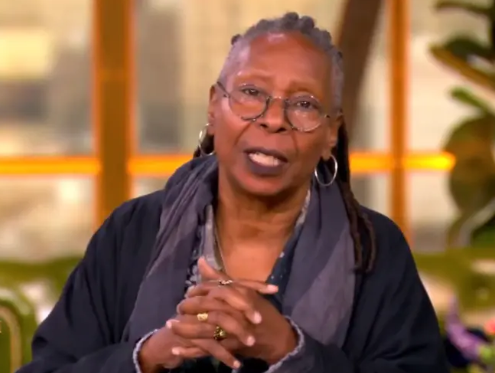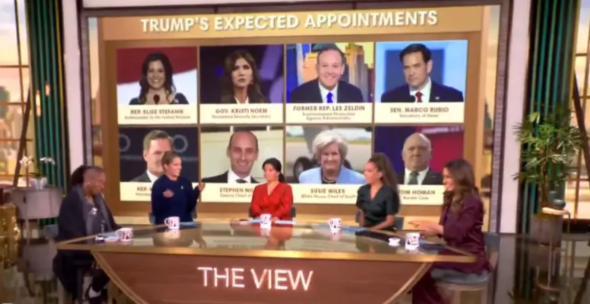Whoopi Goldberg, the celebrated actress, comedian, and longest-running co-host of The View, recently made a surprising admission: if she had the financial freedom to do so, she’d leave the show. The 68-year-old shared her sentiments during Tuesday’s episode, sparking conversation and reflection on her relationship with work, finances, and her role in the public eye.
“I Work for a Living” – Whoopi’s Honest Admission

Goldberg has been a staple on The View since 2007, offering her unique perspective on current events, pop culture, and politics. However, she recently revealed that she relates to the everyday struggles of working-class Americans, describing herself as a “working person” who, despite her success, is driven by the need to earn a living.
“If I had all the money in the world, I would not be here, OK?” Goldberg shared with the audience, hinting at the financial necessity behind her work. “So, I’m a working person, you know?” she continued. Her candid remarks drew both surprise and understanding, as many viewers recognized the realities faced by those who may appear financially secure but continue to work to support their families.
Relating to the Working Class
Goldberg’s statements were in response to a Hot Topic discussion surrounding economic issues. She expressed her empathy for those feeling the effects of inflation and economic instability, connecting her own family’s needs with those of her audience. “My kid has to feed her family. My great-granddaughter has to be fed by her family. I know it’s hard out there,” she explained.
In an era where the cost of living continues to soar, Goldberg’s comments highlighted her shared frustrations and understanding. Despite her celebrity status, she emphasized that, like many others, she relies on a steady income to meet the demands of her family.
Controversial Comments on Grocery Store Owners
Goldberg’s recent commentary hasn’t been without controversy. Last week, she sparked backlash after blaming grocery store owners for inflation, calling them “pigs” for the rising prices in supermarkets. Her comments, made during a live episode of The View, drew immediate criticism from the National Grocers Association (NGA) and other industry representatives who argue that grocery stores are not the root cause of rising prices.
The backlash began when Goldberg remarked, “Your pocketbook is bad, not because the Bidens did anything. Not because the economy is bad. Your grocery bills are what they are because the folks that own the groceries are pigs.” This strong statement ignited debate and concern among grocery store owners, particularly small, family-owned businesses that operate on slim profit margins.

The National Grocers Association’s Response
Following Goldberg’s comments, the National Grocers Association (NGA), which represents over 21,000 grocery stores nationwide, sent a letter to The View’s executive producer, Brian Teta. The letter, penned by NGA’s chief executive Greg Ferrara, expressed deep disappointment, explaining that the grocery industry operates on tight profit margins between 1% and 2%.
Ferrara stated, “Statements that falsely depict grocers as ‘gouging’ not only exacerbate these tensions but also risk further harm to these frontline workers who have continued to serve the public through challenging times.” The NGA argued that food inflation is driven by broader economic factors, including increased labor and distribution costs, which ultimately trickle down to consumers.
Family-Owned Stores Feel the Heat
Goldberg’s comments also struck a nerve within the grocery community, particularly among smaller, family-owned stores. Zulema Wiscovitch, co-president of the Associated Supermarket Group and owner of two stores in New York, expressed her disappointment, stating that Goldberg’s words had gone viral within the industry. Many small business owners felt that her comments unfairly targeted them and incited negativity toward their businesses and employees.

“It shows a lack of understanding of what’s going on with the economy,” Wiscovitch said. “For us to receive this kind of attack from a public figure is totally unacceptable.” Wiscovitch and others argue that grocers are grappling with rising prices from manufacturers and are not responsible for the inflationary pressures faced by consumers.
The Bigger Picture: Food Inflation and Economic Challenges
Goldberg’s comments touch on a much larger issue that has affected consumers globally—food inflation. As prices for goods, labor, and transportation continue to rise, so do grocery costs. Although grocery stores are often on the front lines of consumer frustration, they are just one part of a complex supply chain facing increased expenses.
Industry experts explain that inflation is a result of several economic factors beyond the control of individual stores, including labor shortages, increased fuel prices, and supply chain disruptions. Many grocers have struggled to maintain operations amid rising costs, and for small, family-owned stores, these challenges can be especially overwhelming.
Why Goldberg’s Admission Matters
Goldberg’s candid remarks about her financial reality and the challenges of providing for her family resonate with audiences who are facing similar issues. Her openness brings a sense of authenticity and relatability, bridging the gap between celebrity and the average American worker. While her comments on grocery stores were divisive, her honesty about her own situation underscores that financial challenges can affect people from all walks of life.

Goldberg’s perspective also highlights the unique pressures that come with a high-profile career. Although her status and visibility may suggest financial security, the reality she describes is one that many working families know all too well. Her desire to support her family, despite her public success, brings attention to the complexities of balancing fame, financial responsibility, and personal commitments.
Conclusion: A Celebrity with Real-World Struggles
Whoopi Goldberg’s latest revelations about her work on The View reveal a nuanced portrait of a celebrity grappling with relatable issues. While her controversial statements on grocery store owners may have sparked debate, her honesty about financial responsibility and the realities of supporting a family resonate with many. Goldberg’s story serves as a reminder that financial pressures, family obligations, and real-world challenges are universal, affecting everyone in different ways.
As a public figure, Goldberg’s openness shines a light on the human side of celebrity life, showing that even the most successful individuals face struggles, choices, and complexities that audiences can relate to. Whether you agree or disagree with her views, Goldberg’s willingness to share her story connects with the working class and underscores the shared journey of navigating life’s financial demands.